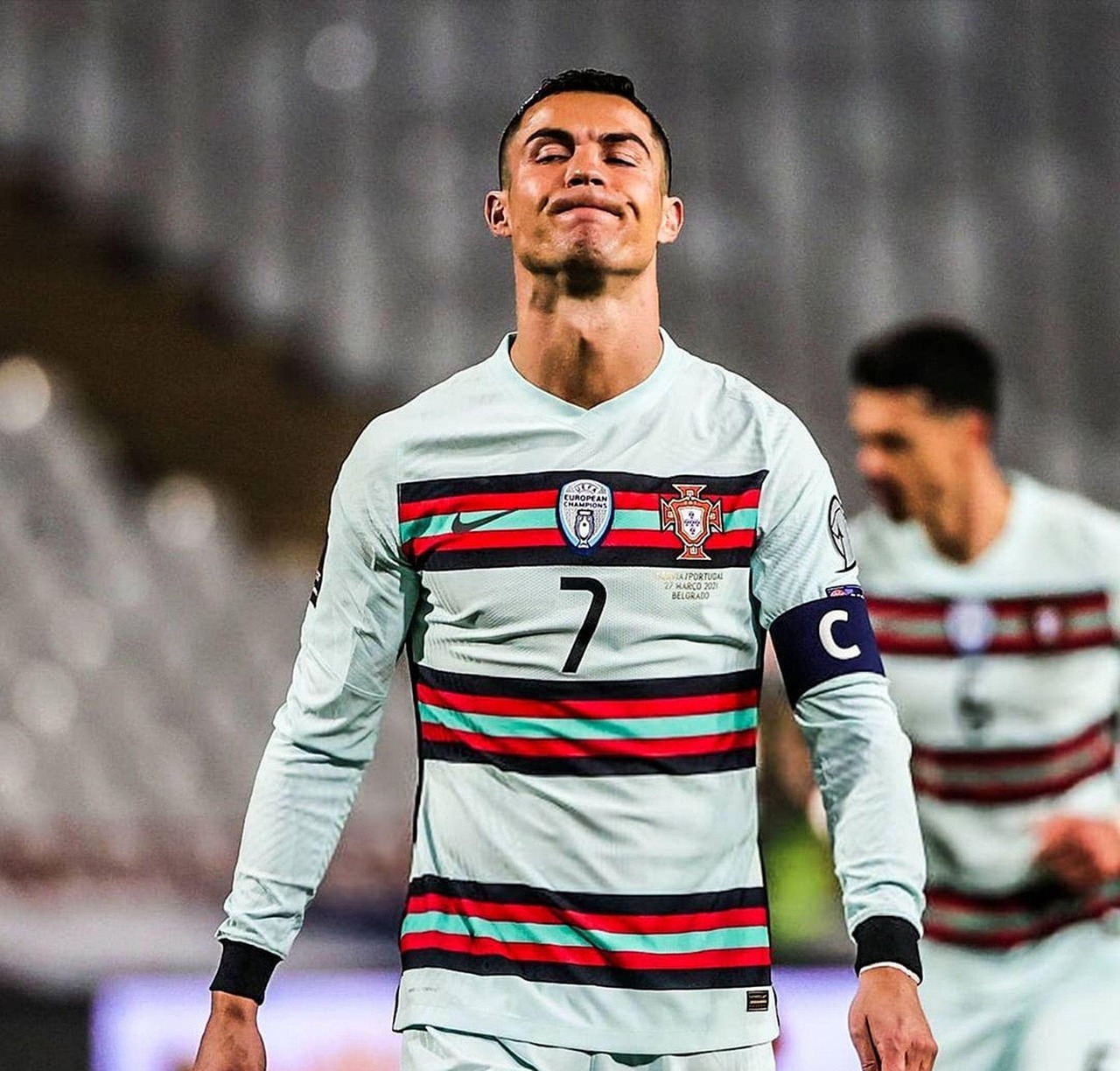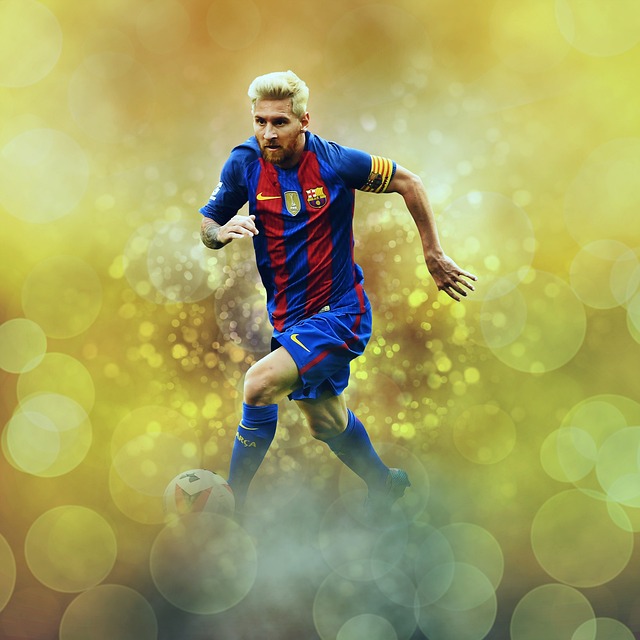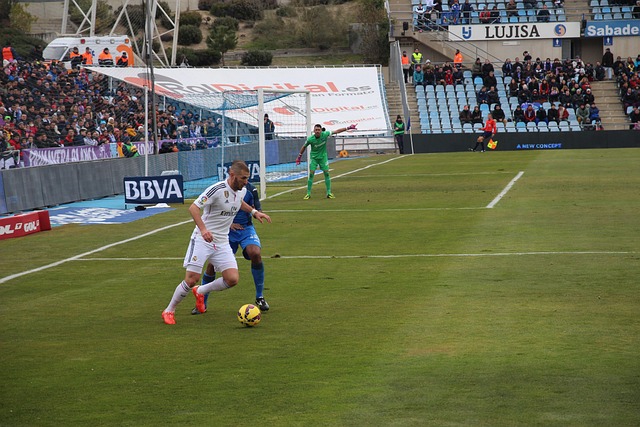The Ultimate Test Messi vs Ronaldo on Football’s Biggest Stage
When Lionel Messi lifted the World Cup trophy in Qatar’s blazing December heat, tears streaming down his face as confetti rained from the Lusail Stadium sky, it felt like the final chapter of football’s greatest debate had been written. Yet just months later, Cristiano Ronaldo stood defiantly in Germany, becoming the first player ever to score in six European Championships, reminding the world that legends don’t simply fade away.
For nearly two decades, the Messi-Ronaldo rivalry has transcended sport itself, dividing dinner tables, fracturing friendships, and spawning endless social media wars. These two titans have rewritten every conceivable club record, accumulated a combined 13 Ballon d’Or awards, and scored over 1,700 career goals between them. They’ve dominated El Clásico battles, conquered different leagues, and redefined what it means to be a footballing superstar in the modern era. Yet for all their club success, for all the individual accolades and record-breaking performances, one question has always lingered like an uncomfortable truth: who delivers when it matters most for their country?
Club football may showcase their week-to-week brilliance, but international tournaments represent football’s ultimate crucible—where careers are immortalized and legacies are forged in the white-hot pressure of representing 45 million Argentinians or 10 million Portuguese. It’s where Pelé earned his crown, where Maradona achieved divinity, and where football’s pantheon of greats have always been measured. Individual brilliance means nothing if it doesn’t translate to the biggest stages, where the weight of a nation’s dreams rests on your shoulders and second chances come once every four years.
This analysis strips away the noise of club achievements and social media statistics to focus on what truly matters: how Messi and Ronaldo have performed when the stakes couldn’t be higher. We’ll dissect their World Cup journeys from 2006 to 2022, examine their continental championship campaigns—Messi’s long struggle and eventual triumph in Copa América, Ronaldo’s European glory—and analyze every crucial moment that has defined their international legacies. From penalty shootouts in semi-finals to the pressure of World Cup finals, from the heartbreak of missed chances to the ecstasy of lifting trophies, this is where legends are truly made.
In the end, only one question remains: when the world was watching and history was calling, who answered?
World Cup Performances The Ultimate Stage
Lionel Messi’s World Cup Journey
Messi’s World Cup story reads like a Shakespearean tragedy that finally found its happy ending. Across five tournaments spanning 16 years, the Argentine maestro transformed from a teenage prodigy overshadowed by teammates to the tournament’s golden ball winner, accumulating 13 goals and 8 assists in 26 matches—numbers that tell only part of his extraordinary narrative.
His journey began in 2006 as an 18-year-old substitute behind established stars like Juan Román Riquelme and Hernán Crespo. The young Messi managed just one goal against Serbia, offering glimpses of brilliance but remaining largely peripheral as Argentina fell in the quarter-finals. Four years later in South Africa, he shouldered greater responsibility but endured the frustration of a goalless tournament, despite Argentina’s talented squad and Diego Maradona’s chaotic management.
The 2014 World Cup in Brazil marked Messi’s emergence as Argentina’s undisputed talisman. His four group-stage goals, including a stunning free-kick against Nigeria and crucial strikes against Bosnia and Iran, dragged an otherwise pedestrian Argentine side to the final. His performance in the round of 16 against Switzerland—where he provided the assist for Ángel Di María’s winner in extra time—epitomized his evolution from goal-scorer to complete playmaker. Though he fell short against Germany in the final, winning the Golden Ball as the tournament’s best player, it established him as a World Cup force.
Russia 2018 brought perhaps his most complete individual performance despite early elimination. His stunning goal against Nigeria, a trademark left-footed curler that kept Argentina’s hopes alive, showcased his ability to deliver under impossible pressure. Yet it also highlighted Argentina’s structural problems—their inability to create chances for their greatest player and defensive frailties that even Messi’s magic couldn’t mask.
Then came Qatar 2022, and football’s greatest individual quest reached its crescendo. At 35, many wondered if this represented Messi’s final chance. His seven goals and three assists told the statistical story, but it was his complete dominance—from the shocking loss to Saudi Arabia through the penalty shootout victory over the Netherlands to his two-goal masterpiece in the final against France—that cemented his legacy. The sight of Messi finally lifting the World Cup, completing football’s most elusive puzzle, represented not just personal vindication but the culmination of one of sport’s greatest individual narratives.
Cristiano Ronaldo’s World Cup Struggles
Ronaldo’s World Cup record presents a fascinating contradiction: individual brilliance consistently undermined by collective failure. Across the same five tournaments, he scored 8 goals in 22 matches—respectable numbers that mask a more complex story of what might have been.
Like Messi, Ronaldo’s World Cup journey began in 2006 as a 21-year-old emerging star. His performances in Germany, including crucial goals against Iran and a memorable penalty against England in the quarter-final shootout, announced his arrival on the biggest stage. However, Portugal’s semi-final defeat to France began a pattern that would define his World Cup career: individual moments of brilliance insufficient to overcome tactical limitations and team shortcomings.
The 2010 and 2014 tournaments proved particularly frustrating. Despite being in his physical prime, Ronaldo managed just one goal across both competitions combined. His visible frustration during these campaigns—gesticulating at teammates, attempting increasingly desperate shots—revealed the burden of carrying a nation’s expectations largely alone. Portugal’s early exits in both tournaments left Ronaldo’s World Cup legacy hanging in the balance.
Russia 2018 offered a tantalizing glimpse of what might have been. His hat-trick against Spain in the group stage, including a stunning free-kick to secure a dramatic 3-3 draw, was pure Ronaldo—technique, power, and clutch gene combining in one perfect performance. His four goals in the tournament showcased his enduring quality, but Portugal’s round of 16 defeat to Uruguay highlighted their inability to build a system around their superstar.
Qatar 2022 was meant to be Ronaldo’s final shot at World Cup glory, and while he became the first player to score in five World Cups with his penalty against Ghana, it felt more like a footnote than a triumph. His visible frustration during Portugal’s quarter-final defeat to Morocco, combined with his reduced role in the team’s tactical setup, symbolized the gap between individual excellence and collective success that has defined his World Cup career.
Continental Championships Regional Dominance
Messi’s Copa América Evolution
If the World Cup represented Messi’s ultimate triumph, Copa América tells the story of persistence rewarding patience. His continental championship journey spans seven tournaments from 2007 to 2024, evolving from a supporting player to the competition’s all-time leading goalscorer with 13 goals, while experiencing both crushing heartbreak and ultimate vindication.
The early years brought promise mixed with disappointment. His debut in 2007 as a 20-year-old showed flashes but ended in group stage elimination. The 2011 tournament on home soil seemed perfect for his first major trophy, yet Argentina’s penalty shootout defeat to Uruguay in the quarter-finals began what would become known as the “final curse.” This pattern repeated with devastating consistency: runner-up finishes in 2015 and 2016, where Messi’s individual brilliance—including five goals and the tournament’s best player award in 2015—couldn’t overcome Argentina’s collective failings in the final moments.
The 2016 Copa América Centenario final loss to Chile proved particularly crushing. Messi’s missed penalty in the shootout, followed by his tearful retirement announcement (later rescinded), captured the weight of expectations and personal anguish that had built over a decade of near-misses. His declaration that “it’s not meant to be” seemed to summarize not just his Copa América struggles but his entire international career’s narrative.
The 2021 triumph in Brazil changed everything. At 34, with many writing off his international chances, Messi delivered his most complete tournament performance. His four goals and five assists told part of the story, but it was his leadership—visible in every celebration, every tactical adjustment, every moment of encouragement to teammates—that proved transformative. The image of Messi being lifted by his teammates after defeating Brazil in their own backyard represented not just tournament victory but emotional catharsis years in the making.
The 2024 Copa América victory cemented his continental legacy. Despite dealing with injury in the final against Colombia, his tournament-leading five assists and inspirational leadership guided Argentina to back-to-back titles. His emotional reaction during the final, playing through pain until forced to leave in tears, epitomized his evolution from individual star to complete team leader.
Ronaldo’s European Championship Mastery
Ronaldo’s European Championship record stands as arguably his greatest international achievement, with his six tournament appearances from 2004 to 2024 producing 14 goals and becoming the competition’s all-time leading scorer while delivering Portugal’s greatest triumph.
His Euro journey began dramatically in 2004 on home soil. As a 19-year-old, Ronaldo’s performances—including crucial goals in the semi-final against the Netherlands—captivated a nation and announced his arrival as Portugal’s future. The final defeat to Greece proved heartbreaking but established the foundation for future success.
The middle years brought individual excellence without collective reward. His standout performances in 2008 and 2012, including spectacular goals and moments of individual brilliance, couldn’t lift Portugal beyond the quarter-finals. However, these tournaments showcased his evolution as a complete player, developing the leadership qualities that would prove crucial later in his career.
Euro 2016 in France provided Ronaldo’s defining international moment. Despite suffering a knee injury early in the final against France, his transformation into an animated coach on the sidelines—encouraging teammates, barking tactical instructions, celebrating every Portuguese success—proved as influential as any goal he might have scored. His emotional celebration when Éder scored the winning goal captured the culmination of 12 years of international striving.
The 2020 European Championship (played in 2021) saw Ronaldo cement his tournament legacy. His five goals, including two penalties against France and a spectacular brace against Germany, made him the competition’s all-time leading scorer and tied him for the Golden Boot. Even in defeat against Belgium, his individual performance reminded everyone of his enduring quality.
Euro 2024 represented his tournament farewell, and while Portugal’s quarter-final exit disappointed, Ronaldo’s emotional reaction—tears flowing as he likely realized this was his final European Championship—captured the end of an era for both player and tournament.
The Numbers Game Statistical Showdown
When stripped to pure numbers, the Messi-Ronaldo international tournament comparison reveals fascinating contrasts. Across all major tournaments, Messi edges the goal-scoring battle with 21 goals to Ronaldo’s 22, but Messi’s 13 assists to Ronaldo’s 8 highlight different approaches to tournament impact. Messi’s goals-per-game ratio of 0.43 marginally trails Ronaldo’s 0.47, but these numbers mask deeper tactical contexts and team dynamics.
In knockout stages—where tournaments are truly won—both players have delivered clutch performances, though their methods differ significantly. Messi’s playmaking becomes more pronounced in elimination rounds, with his assist numbers spiking in crucial matches. His 2022 World Cup knockout stage saw him directly involved in 8 of Argentina’s 11 goals through goals and assists. Ronaldo’s knockout record shows his evolution from pure goalscorer to complete leader, with his Euro 2016 final performance representing leadership transcending statistics.
The penalty conversion comparison offers another lens: both players have felt the crushing weight of missed spot-kicks in crucial moments. Messi’s 2016 Copa América final miss and Ronaldo’s various tournament penalty saves have shaped narratives, yet both have also delivered in pressure moments—Messi’s perfect penalty record in the 2022 World Cup shootouts and Ronaldo’s crucial spot-kicks throughout his European campaigns.
Trophy Cabinet The Ultimate Measure
The stark contrast in major tournament victories tells its own story. Messi’s collection now includes one World Cup and two Copa América titles, while Ronaldo boasts one European Championship and one UEFA Nations League. The numbers alone don’t capture the context—Messi’s World Cup triumph at 35 representing football’s ultimate individual achievement, while Ronaldo’s Euro 2016 victory showcased leadership beyond mere performance.
Runner-up finishes reveal the fine margins that separate triumph from heartbreak. Messi’s four final defeats (three Copa América, one World Cup) before his breakthrough victories highlight both the burden of expectation and the persistence required for ultimate success. Ronaldo’s Euro 2004 final loss on home soil and various semi-final defeats show how international football’s knockout format can crush even the greatest individual talents.
The supporting cast analysis reveals crucial context often overlooked in individual comparisons. Argentina’s golden generation of the 2000s and early 2010s perhaps underachieved collectively, while Portugal’s limited talent pool outside Ronaldo often left him carrying impossible burdens. The transformation of both teams in recent years—Argentina’s tactical cohesion under Lionel Scaloni and Portugal’s improved depth—has coincided with their stars’ greatest triumphs.
Defining Moments When Legends Are Made
Certain moments transcend statistics and define legacies. Messi’s 2022 World Cup final performance—two goals, a penalty conversion, and leadership under ultimate pressure—represents perhaps the greatest individual display in a World Cup final since 1986. His celebration, arms raised to the sky as he finally conquered football’s summit, encapsulated redemption narratives rarely seen in sport.
Ronaldo’s Euro 2016 final transformation from injured player to motivational coach demonstrated leadership that statistics cannot measure. His animated encouragement of teammates, tactical instructions from the sideline, and emotional celebration of victory showed a different dimension of greatness—the ability to impact games beyond personal performance.
Both players have delivered in penalty shootouts when nations’ dreams hung in the balance. Messi’s perfect record in the 2022 World Cup shootouts, particularly his composed conversion against the Netherlands in the quarter-final, showed mental strength forged through years of disappointment. Ronaldo’s various penalty successes and failures throughout major tournaments highlight the mental warfare that defines knockout football.
The Team Dynamic Factor
The evolution of both Argentina and Portugal’s tactical approaches around their superstars reveals coaching impact on individual legacy. Argentina’s transformation under Scaloni—building a system that maximized Messi’s playmaking while providing defensive solidity—proved crucial to their recent successes. The team’s collective pressing, allowing Messi to conserve energy for crucial moments, represented tactical evolution enabling individual brilliance.
Portugal’s various tactical experiments with Ronaldo showcase different challenges. From his wide role in early tournaments to his evolution as a complete forward, different coaches have extracted varying levels of team success. The decision to play him as a substitute in key 2022 World Cup matches sparked controversy but highlighted the delicate balance between individual legacy and team success.
The role of supporting cast quality cannot be understated. Argentina’s depth in recent tournaments—from Emiliano Martínez’s goalkeeping heroics to Ángel Di María’s big-match performances—provided the foundation for Messi’s individual brilliance to flourish. Portugal’s reliance on Ronaldo throughout his career, while testament to his quality, also highlights the burden carried by truly elite players for their nations.
Statistical Deep Dive Beyond the Headlines
Advanced metrics reveal nuanced differences in tournament impact. Messi’s shot creation numbers in major tournaments significantly exceed Ronaldo’s, reflecting his evolution into a complete playmaker. His expected assists (xA) numbers particularly spike in knockout rounds, where creative burden increases exponentially.
Ronaldo’s shooting efficiency in tournaments shows interesting patterns—lower conversion rates but higher shot volumes, reflecting both his confidence and occasional wastefulness under pressure. His aerial dominance statistics in tournaments highlight a different attacking approach, with headed goals comprising a larger percentage of his tournament strikes than Messi’s ground-based finishes.
Age-curve analysis shows both players maintained elite tournament performance well into their thirties, though their roles evolved significantly. Messi’s 2022 World Cup at age 35 represents one of the greatest individual tournaments by a player past their supposed prime. Ronaldo’s goal-scoring at Euro 2020 at age 36 similarly defied conventional aging patterns for elite athletes.
The Final Verdict Legacy Defining Performances
Weighing their international tournament legacies requires balancing individual brilliance, team success, and contextual factors. Messi’s World Cup triumph provides an ultimate peak that Ronaldo cannot match—football’s most coveted prize won through individual excellence and collective leadership. The emotional weight of his victory, combined with his complete tournament performance, creates a legacy moment unmatched in modern football.
However, Ronaldo’s European Championship success and superior longevity in tournament football present compelling counter-arguments. His ability to score in six different European Championships represents unprecedented consistency, while his leadership in Portugal’s 2016 triumph showcased qualities beyond pure football ability.
The context of their respective teams and tournaments adds complexity to direct comparison. Messi’s South American opponents and tournament format differ significantly from Ronaldo’s European competition. The strength of opposition, travel demands, and tournament structures all influence individual performance capabilities.
Ultimately, Messi’s 2022 World Cup triumph tips the scales in international tournament legacy. While both players have delivered extraordinary individual performances and achieved significant team success, the World Cup’s unique status in football hierarchy makes Messi’s victory decisive. Ronaldo’s Euro 2016 success and tournament longevity ensure his international legacy remains formidable, but in the final analysis of tournament performances, Messi’s complete narrative—from heartbreak to ultimate triumph—edges this most crucial of comparisons.
Conclusion
The Messi-Ronaldo international tournament comparison ultimately transcends simple statistical analysis or trophy counting. Both players elevated their respective national teams and provided moments of individual brilliance that will be remembered long after their careers end. Their contrasting paths—Messi’s journey from disappointment to ultimate vindication, Ronaldo’s consistent excellence across multiple tournaments—showcase different expressions of sporting greatness.
Their tournament legacies extend beyond personal achievement to inspirational impact on future generations. Young players worldwide have witnessed both men handle the pressure of representing their nations, dealing with failure and success in equal measure. Their longevity at tournament level—both playing meaningful roles well into their thirties—has redefined expectations for elite athlete careers.
In the end, international tournaments provided the stage where both players proved their greatness wasn’t confined to club football’s structured environment. They adapted to different tactical systems, handled immense pressure, and delivered when their countries needed them most. While Messi’s World Cup triumph may provide the decisive edge in this comparison, both players have enriched international football immeasurably, ensuring their tournament legacies will endure as benchmarks for future generations of footballing excellence.


